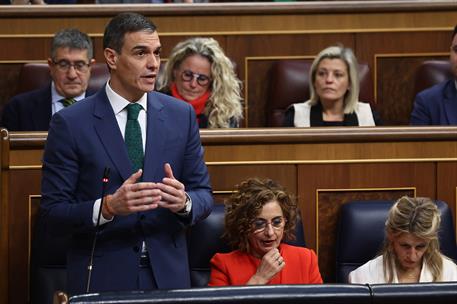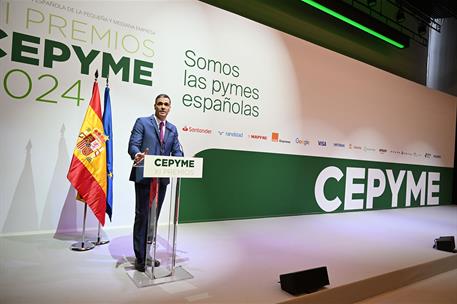Pedro Sánchez: "If tariffs are imposed on us, we must respond decisively; Europe will defend itself, we will act swiftly, proportionally and with unity"
President's News - 2025.3.28
El Beatriz Auditorium, Madrid
The President of the Government of Spain, Pedro Sánchez, during his speech (Pool Moncloa/Fernando Calvo)
The head of the Executive warned that, if the United States does decide to impose tariffs on the European Union, "we will have to respond decisively" and "Europe will defend itself by acting swiftly, proportionally and with unity". This is what he said during his speech at the forum 'European Funds: Towards strategic autonomy', organised by elDiario.es and held for the fifth time at the Beatriz Auditorium in Madrid. The event was attended by the Minister for Home Affairs, Fernando Grande-Marlaska; the Minister for Transport and Sustainable Mobility, Óscar Puente; the Minister for Education, Vocational Training and Sports and Government Spokesperson, Pilar Alegría; the Minister for Agriculture, Fisheries and Food, Luis Planas, and the Minister for Science, Innovation and Universities, Diana Morant.
The president reiterated his "call to the US Administration to reconsider, to enter into dialogue with the European Commission and to stop this nonsense", but vowed that action would be taken quickly, because "the government will stand by our farmers, our companies and our people, right from the start", with the development of a National Contingency Plan to help the most affected sectors"; with proportionality, because "a trade war benefits no one, and harms everyone, especially the weakest", and with unity, because "we will respond in a coordinated manner with our European partners".
The President of the Government of Spain, Pedro Sánchez, with members of his Executive and other forum participants | Pool Moncloa/Fernando Calvo
"No reforms, no funds"
In his speech, Pedro Sánchez emphasised that "the macro and the micro go hand in hand thanks to the efforts of workers and companies" and to a government that "since 2018 has prioritised people's lives". "In the face of those who pull out the chainsaw and invoke the invisible hand of the market, this government is clear: there is no better way forward than to act decisively. The visible hand of good economic policy", he emphasised. With this conviction, and "thanks to the solidarity of our European neighbours, we are able to confront the biggest transformation of our productive fabric in decades" with the Recovery, Transformation and Resilience Plan..
The President stressed that "without reforms, there are no funds" and that "Spain is delivering", as the country that has met the most milestones and transfer targets, thanks to which it has already received almost 48 billion euros in transfers, more than any other Member State. This figure is part of the 80 billion euros of non-repayable funds which, together with the corresponding loans, amount to the equivalent of 10% of Spanish GDP. He highlighted the advances in green taxation, coastal conservation and water resource management policies, the promotion of sustainable mobility, the deployment of renewable energies and the ecological transformation of agriculture and fishing. Without this, "Spain would have missed the best opportunity we have ever had to modernise our country", and he argued that "we should be very clear about this right now, when some people are rejecting the European Green Pact out of pure opportunism".
In this respect, he recalled that the autonomous communities have managed a third of the Recovery Plan funds launched to date through the various calls for proposals. "One in every three euros. An example of co-governance and institutional loyalty, which also strengthens our territorial cohesion", he pointed out. However, he argued that "this loyalty must be mutual, because conditionality binds us all". "We will not allow anyone's ideological vagaries to jeopardise the arrival of Next Generation funds. We will not allow any government controlled directly or indirectly by the denialist far right to put a single euro of European funds at risk" because "it is tantamount to denying future opportunities for thousands of companies in our country", he warned.
The President of the Government of Spain, Pedro Sánchez, during his speech at the forum 'European Funds: Towards Strategic Autonomy' | Pool Moncloa/Fernando Calvo
The contribution of the Recovery Plan: 2.6% rise in GDP
"We are managing to translate Spain's extraordinary economic performance into people's daily reality", an achievement that "owes much to the decisive contribution of the Recovery Plan funds", he stressed. The President of the Government of Spain highlighted the fact that the Recovery Plan contributed to a 2.6% increase in Spanish GDP up to December 2024, according to calculations by the Ministry of Economy, and 40% of the beneficiaries are SMEs. In addition, they help to reduce the risk premium and have contributed to reducing debt by 7.8 points, according to European Central Bank estimates. "By joining forces, we are transforming the Spanish economy along two major axes: the energy transition and the digital transformation", he added.
The President of the Government of Spain, Pedro Sánchez, attends the forum 'European Funds: Towards Strategic Autonomy' | Pool Moncloa/Fernando Calvo
Economic policy "clear success": inflation and deficit down
Pedro Sánchez also highlighted the good progress being made by the Spanish economy and the "clear success" of the Government's economic policy, in view of the "magnificent figures" published by the INE (National Statistics Institute) on the fall in inflation by seven tenths of a percentage point in March, to 2.3%. In addition, the OECD has once again placed Spain at the head of the advanced economies in 2025, after closing 2024 with growth of 3.2%, "another year of records" in tourism (94 million visits), exports of goods (nearly 400 billion) and the labour market (21.5 million Social Security contributors).
In this regard, he pointed out that, despite the difficulties of the past few years in which Spain has faced a pandemic, an energy crisis, the war in Ukraine and growing international uncertainty, Spain has shown that "it is possible to grow and distribute wealth with an economic policy that puts people at the centre: ensuring that the wealth created reaches the middle and working classes", through measures such as the 61% increase in the minimum wage, the minimum living income, the labour reform, which has reduced the rate of temporary employment to figures unseen since 1987, and the "unprecedented" deployment of social policies to reduce inequality.
"Spain is moving forward, despite everything and against everything, and it is doing so by growing inwards, opening up to the outside world and contributing as never before at the helm of the European Union". Spain now contributes 50% of the Eurozone's growth, despite representing only 10% of GDP, and is the large European economy that has gained the most productivity per hour since 2019 and the one that creates the most jobs in the entire Union: one in three new jobs, reducing inequality to historic lows.
And all of this, he added, with a "rigorous, serious and responsible" fiscal policy, a day after it was announced that Spain closed 2024 with a deficit reduced by seven tenths of a percentage point compared to 2023, to 2.8%, the best figure since 2018. Moreover, public debt continues to fall and is now 22.5 points below the peak reached in the pandemic. "In short, we are demonstrating that it is possible to strengthen social cohesion by managing with rigour and efficiency", in addition to the fact that households are gaining purchasing power, since, according to the OECD, Spain is the only large economy in the European Union in which real wages are above pre-pandemic levels and household wealth is at an all-time high, according to the Bank of Spain.
Non official translation








